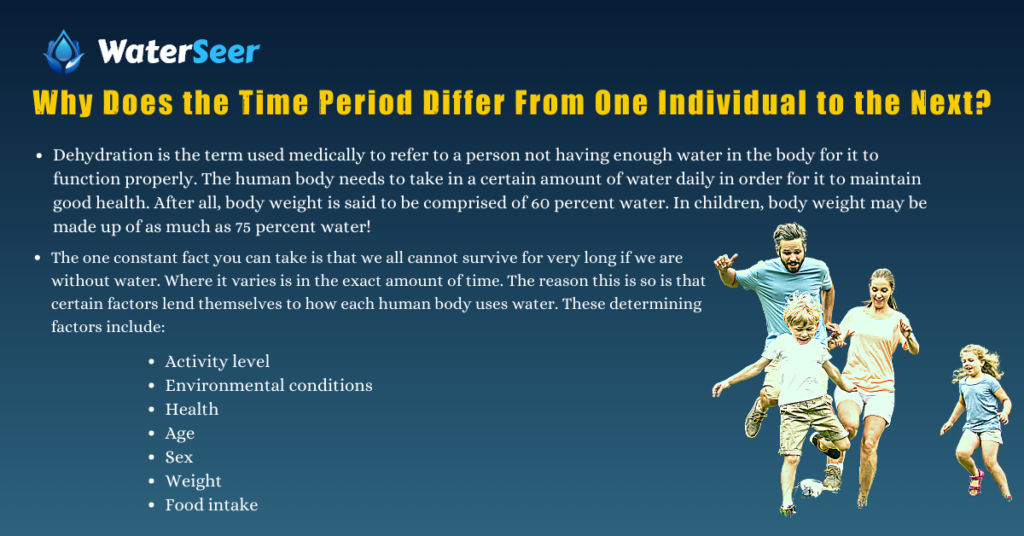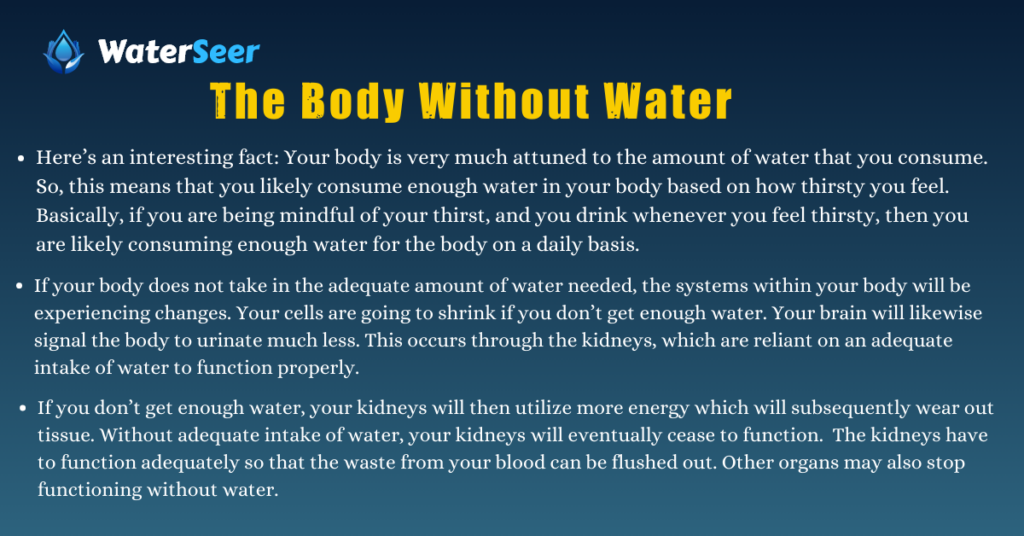Imagine this: You wake up one morning, and all the taps are suddenly switched off. The water supply for your community is completely cut off. The streams, rivers, and wells all just inexplicably ran dry. Bottled water supply is likewise all of a sudden down to zero. You are a human being in a world where, all of a sudden, there is no water to drink.
How do you think you would react should this phenomenon occur? And even more so, how long do you think you would be able to survive?
It is an irrefutable fact that water is truly among the most crucial elements for life on this planet. It is one of the fundamental ingredients existing on this planet. Our bodies are composed largely of water. You need water to survive; we all do. So, what happens then if, for some reason, we all of a sudden cannot get access to this essential liquid?
As we ponder our existence and our day-to-day needs, this question has surely crossed our minds quite a few times. After all, it’s human nature to wonder how long we can hold on even without being able to drink water. But when faced with the query “How long can you go without water?” it may not be as cut and dry (pun unintended!) as one may think.
The Short Answer
The short answer is to how long can you go without water is this: While a person may be able to survive for weeks even without food, depending on the composition of their body, their sex, and the environment they are in, the fact of the matter is that the human body will be able to survive for a lesser period of time without H20. Indeed, one’s body will only be able to survive for two to four days without it.
While you can go for longer without food, dehydration is something your body will only be able to take for just a few days. Do take note that while you will still survive for weeks from starvation, it can still cause massive organ failure that will not be good for your health and survival in the long run.
Depriving yourself of water will also be very damaging to your body – and the damage begins much earlier than if you deprive yourself of food.
Also Read:- What is pH in Water? Definition, Importance & Level Chart
The Long Answer
It can be close to impossible to provide an answer to this deceptively simple question that will apply to all. Though the short answer gives a relative range of time for survival, the long answer goes on to tell us that so many variable factors affect and determine the survival time of a person.
There is no reliable predictor of how speedily dehydration can kill a person. Though a lot of survival research suggests an average person may be able to survive for a couple of days or a few more (some even say a week), that’s all just, at best, a very rough estimate.
Proper hydration is absolutely essential to one’s survival. It is imperative that the human body is able to get a significant amount of water each and every day in order to be able to function properly. This is due to the fact that you excrete water constantly through natural body functions like urination and sweat, so it is vital that you need to replenish these lost fluids.
The hard truth is that you just will not live long without being able to consume a healthy amount of water each day. It is only possible to exist without water for a handful of days. And depending on certain factors, that length of time may possibly be even shorter.
Why Does The Time Period Differ From One Individual to The Next?

Dehydration is the term used medically to refer to a person not having enough water in the body for it to function properly. The human body needs to take in a certain amount of water daily in order for it to maintain good health. After all, body weight is said to be comprised of 60 percent water. In children, body weight may be made up of as much as 75 percent water!
The one constant fact you can take is that we all cannot survive for very long if we are without water. Where it varies is in the exact amount of time. The reason this is so is that certain factors lend themselves to how each human body uses water. These determining factors include:
- Activity level
- Environmental conditions
- Health
- Age
- Sex
- Weight
- Food intake
The factors listed above all contribute to how your body uses up water. To cite an example, if you live in a place where the climate is hotter, your body will then sweat more. This will lead to more water consumption.
Another example is that if you are sick with a fever, have diarrhea, or are vomiting – you will then be losing water more speedily. And one more example is that if you are exercising, which means an increased level of activity, your body will be losing water more quickly.
In addition to these examples, there are foods that you intake that will contain more water in them compared to other foods. And when we say water consumption, we can also include other drinks and beverages like juice and herbal tea – BUT, and this is a big but, keep in mind that some drinks can actually contribute more to dehydration, such as drinks that have alcohol or caffeine in them.
Water is more crucial for survival than food. The body can simply exist for a lesser period of time without water compared to without food. Water intake is just that critical to one’s health and survival. This is why medical experts recommend that women take in around 91 ounces of water each day and that men take in around 125 ounces of water each day.
This can be done through beverages and food combined. This average recommended intake is for those who are in good health, not exceptionally or particularly active, and reside in an area with a moderate climate.
Also Read:- How Much Water Should You Drink Per Day to Stay Hydrated?
The Body Without Water

Here’s an interesting fact: Your body is very much attuned to the amount of water that you consume. So, this means that you likely consume enough water in your body based on how thirsty you feel. Basically, if you are being mindful of your thirst, and you drink whenever you feel thirsty, then you are likely consuming enough water for the body on a daily basis.
If your body does not take in the adequate amount of water needed, the systems within your body will be experiencing changes. Your cells are going to shrink if you don’t get enough water. Your brain will likewise signal the body to urinate much less. This occurs through the kidneys, which are reliant on an adequate intake of water to function properly.
If you don’t get enough water, your kidneys will then utilize more energy which will subsequently wear out tissue. Without adequate intake of water, your kidneys will eventually cease to function. The kidneys have to function adequately so that the waste from your blood can be flushed out. Other organs may also stop functioning without water.
Inadequate water supply will impact other functions of the body as well. If your body experiences a lack of water:
- Electrolytes will become imbalanced
- Body temperature will not stay regulated
- The brain may swell
- The joints may not function properly
- Blood pressure may decrease or increase
Risks And Side Effects Of Not Getting Enough Water. Dehydration poses great risks to the body, including:
- Tiredness
- A lack of energy
- Brain swelling
- Injuries such as heat stroke or heat cramps
- Hypovolemic shock
- Seizures
- Kidney failure or other organ failures
- Death
When you do find yourself dehydrated, you also must be very careful with your fluid intake. There are appropriate methods of rehydration, which can also vary for each individual.
Adults may need to just drink water for them to rehydrate. Small kids may require a drink that has sodium in addition to water for them to appropriately replenish their bodies. If you become severely dehydrated, it may be necessary for you to intravenous administration of water as well as salt.
Also Read:- Water Intoxication: How Much Water is Too Much Water?
FAQ’s
What happens if you don’t drink water for three days?
If you don’t intake water for three days, your body will be get extremely dehydrated. Your organs will stop functioning correctly, due to which several vital processes will not occur. The first organ that will start shutting off will be your brain resulting into stroke, fainting, and even death.
How long can you go without water before you pass out?
According to several studies, humans can only survive up to 3 days without water. After three days, the body will go into a highly dehydrated phase, impacting the organs. The organs will not perform their function, especially the brain, which can result in several other lethal consequences like death.
Can you go 40 days without water?
No, a person’s body cannot live upto 40 days without water. The human body requires water to function because it is imperative for the cells and organs to perform their function. According to several studies, a person can last up to 3 to 4 days without water, after which the organs will not perform their function.
Is it healthy to never drink water?
It is not healthy to not drink water, because you will eventually die. It is essential to hydrate the human body properly and maintain the water level. It is crucial because our cells depend on water to perform their functions. The cells will start dying if you don’t consume enough water.
Is it better to sip or chug water?
Drink water by sipping it slowly instead of chugging it. The water in your mouth passes through a food pipe. When you drink it slowly, the pipe gets time to facilitate water movement to the stomach smoothly, with no problem.
What happens if you don’t drink water for a year?
An average human body will not survive more than a week without water. Even after three to four days, the body will start giving you sign that there is something wrong. The cells will begin dying, due to which a normal human being cannot survive. A year is way too long to expect a regular body to survive without water.
How many liters should a woman drink a day?
Drinking too much water will not harm the body’s metabolism. According to the experts, around 2 to 3 liters can be considered a mandatory amount of water that women should consume. Apart from this, if you want to intake around 4 to 5 liters, it can be entirely your choice, but notice the signs, as you can suffer from water intoxication.
What happens to your body when you start drinking more water?
When you start drinking more water, your body will be much healthier than when you didn’t. You will feel much more energetic and active throughout the day. You will not feel hungry, so you will not crave junk food. Furthermore, you will have to go to the bathroom frequently if you drink too much water.
What is the healthiest water to drink?
Normal water is a healthy drink because it is rich in all the nutrients and minerals required for the proper growth and functioning of the body. Apart from this, there are several bottled water types available in the market.
Bottom Line
The bottom line is that it is very vital that you maintain an adequate quantity of water within your body. In the absence of water, the human body will only be able to survive for a few days. Generally, your body is attuned to your body’s water needs, so being mindful of drinking when you feel thirsty is a good guide to staying hydrated. Be mindful also of other factors that affect the amount of water your body needs. Stay hydrated!

